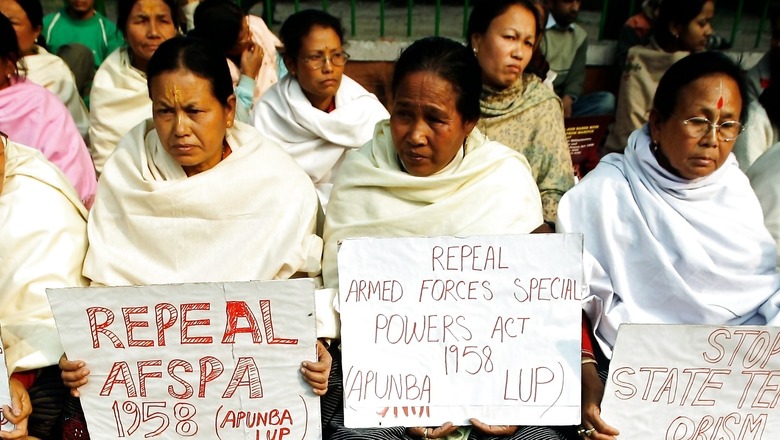
views
In a ground-breaking development, the Centre on Thursday said that areas covered under the controversial Armed Forces Special Powers Act (AFSPA) in northeastern states of Nagaland, Assam and Manipur will be reduced.
Union Home Minister Amit Shah tweeted, “In a significant step, GoI under the decisive leadership of PM Shri @NarendraModi Ji has decided to reduce disturbed areas under Armed Forces Special Powers Act (AFSPA) in the states of Nagaland, Assam and Manipur after decades.”
Shah also said the reduction in areas under AFSPA is due to the improved security situation and “fast-tracked development” to end insurgency and bring peace in the Northeast by the Narendra Modi government.
Here’s a low-down on the law:
What is AFSPA?
Promulgated by the British, the law was enacted in response to the Quit India movement in 1942. Prime Minister Jawaharlal Nehru decided to retain the Act after Independence. In 1958, the AFSPA was notified as an Act.
A note on AFSPA on the Union Home Ministry website says that its enactment in 1958 was necessitated by the law order situation in the northeastern states where state governments and local authorities were found to be “incapable” of dealing with disturbances in the region. “Violence became the way of life in northeastern states of India,” the note says, adding that under the law thus brought in “some special powers have been given to the members of the armed forces in disturbed areas”.
A British remnant
The Human Rights Watch (HRW) says that AFSPA is based on a 1942 British colonial-era ordinance that was aimed at curbing the Indian independence movement. It was initially aimed at containing an armed rebellion by Naga militants but a 1972 amendment extended it to all of the seven northeastern states while similar laws were put in place to counter militancy in Punjab, from 1985 to 1994, and Jammu and Kashmir in 1990.
The law was passed by both the Houses of Parliament and received Presidential assent in September 1958, entering the statute book as the Armed Forces (Special Powers) Act, 1958. Initially enacted to cover the states of Arunachal Pradesh, Assam, Manipur, Meghalaya, Mizoram, Nagaland and Tripura, it has since undergone several amendments with some states and areas having been removed from its purview.
The unbridled powers
Under AFSPA, armed forces are defined as any military troops and “the air forces operating as land forces, and includes other armed forces of the Union so operating”.
Officers stipulated under AFSPA can arrest without warrant any person in connection with the commission of a cognisable offence or even on the “reasonable suspicion… that he has committed or is about to commit a cognisable offence”. The Act allows such officers to “use such force as may be necessary to effect the arrest”.
AFSPA also permits officers — based on the “opinion that it is necessary so to do” — to “destroy” any structure or shelter from which armed attacks are made or are likely to be made or are attempted to be made.
Armed forces are also allowed to “enter and search without warrant any premises”. Section 6 of the Act grants immunity from prosecution for actions carried out in “disturbed areas” by security forces. “No prosecution, suit or other legal proceedings shall be instituted, except with the previous sanction of the Central Government, against any person in respect of anything done or purported to be done in exercise of the powers conferred by this Act,” it says.
Withdrawn from Mizoram, Tripura and Meghalaya earlier
The Union Home Ministry had told Parliament in January 2019 that AFSPA was operational throughout the states of Assam and Nagaland and in Manipur with the exception only of the municipal area of its capital city Imphal.
The Act was also said to be in force in three districts — Tirap, Changlang, Longding — of Arunachal Pradesh and the areas under the jurisdiction of eight police stations in the districts of Arunachal Pradesh bordering Assam. The ministry had added that while the notification declaring “disturbed areas” in Manipur and Assam had been issued by the respective state governments, the government of Nagaland had “not supported the extension of notification declaring Nagaland as ‘disturbed area’ under AFSPA, 1958”.
AFSPA has been withdrawn from Mizoram, Tripura and Meghalaya. The Union Home Ministry has told Parliament that the decision to notify any area as a “disturbed area” under AFSPA “is taken periodically after making an objective assessment of the ground situation in consultation with security agencies and the concerned state governments (sic)”.
The brickbats
AFSPA has long been criticised by several civil society groups and political players in the northeastern states. Calls for the withdrawal of AFSPA as a “draconian” measure that fuels human rights violations and discontent among the people weren’t uncommon.
The Human Rights Watch says that AFSPA provides “wide powers to shoot to kill, arrest on a flimsy pretext, conduct warrantless searches, and demolish structures” and that these special powers have led to cases of abuse, rape, torture and forced disappearances involving the armed forces “without fear of being held accountable”.
It says that the Act “violates provisions of international human rights law, including the right to life, the right to be protected from arbitrary arrest and detention, and the right to be free from torture and cruel, inhuman, or degrading treatment”. The protection from prosecution for members of the armed forces further “denies the victims of the abuses the right to a remedy”.
Read all the Latest News India and Breaking News here


















Comments
0 comment